Peter MALONE
Saturday, 18 September 2021 19:23
Triumph of the Spirit
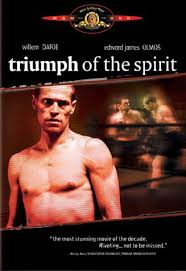
TRIUMPH OF THE SPIRIT
US, 1989, 115 minutes, Colour.
Willem Dafoe, Wendy Gazelle, Edward James Olmos, Robert Loggia, Costas Mandaylor.
Directed by Robert M. Young.
Triumph of the Spirit is a holocaust story. It focuses on Greek Jews and their transportation to Poland, to Auschwitz. In fact, the film itself was filmed on location in Greece and at the camps at Auschwitz.
It is the story of Salamo Arousch, an Olympic boxer of 1936, and his struggle to survive in the concentration camp. The film gives a great deal of attention to day by day life in the camp, the physical details of the camp, the work, the suffering and the eccentricity of the authorities in using Arousch for his boxing skills to entertain the German staff.
Willem Dafoe gives a solemn performance as Arousch showing, his versatility from films such as Platoon, Last Temptation of Christ, Mississippi Burning. Robert Loggia is very good as his Father. Edward James Olmos is a gypsy Kapo in the camp.
The film was directed by Robert M Young (The Ballad of Gregorio Cortez, Extremities, Saving Grace, One Trick Pony).
1. The impact of the film? Humanity and suffering? The Holocaust?
2. The 80s perspective on the holocaust? The many movies portraying facets of it? Audience knowledge and response? Emotion? The importance of remembering? The warning about history and it happening again? The us of Greek locations? Poland, the concentration camps, the use of Auschwitz for locations? Authentic atmosphere? Musical score?
4. The title, it's meaning (and the contrast with Leni Reifenstahl's Triumph of the Will, the pro Hitler propaganda film)?
5. The film as a true story? Information given? The background of the Olympic Games? The concentration camps and their life? The end note?
6. The flashback structure from prison? Salamos' voiceover and tone? Memories of Greece, the sunlight, the home, the family, his brothers, Love for his Father, his love for Allegra? Details of Life, Synagogue, the wedding? the boxing and the championship? His winning? The arrival of the Nazis and the effect in Greece?
7. The rounding tip of the Jews? Salamo going to the cinema, the newsreels of Hitler? The farewell to Allegra? Her arrest? On the trains, the long trip, the deaths? The bewildered arrival? people being sent to left and right, not knowing their fate? Deaths? Workers? The audience knowing? The workers going to the camp, the strippIng, dilsenfecting the showers? The taking of possessions?
8. Salamo and his father, Avram and his friends? The entry into the camp, the humiliations, the taking of the possessions and the personal touches? The crowded bunks in the huts? Details of life, the lack of food? the hard labour? the parades? the early waking? Violence? The harsh orders, the authorities? The reality of life in the camp?
9. The women, the same treatment, pulling the heavy machines, the bunks, the food? Allana and her story about being pregnant, a labourer giving her food, the support? Allegra fighting and being whipped for Allana? The woman with no shoes? The truth and the examination of Allana, the brutality? The effect on Allegra? Their friendship?
10. The men and their checked for health and strength? People being detailed to death? Salamo relationship with his father, their working together? His father's age, his being chosen for death, the pathos of the farewell? Avram and the work detail in the ovens? The refusal to work and their being shot? The Kapos and their authority? Salamo and his fight, winning, the Kapo being shot?
11. The officers and the memories of the Olympics, their interest in Salamo, the boxing bouts, winning with no conditions? The audience watching? The bread being given for the victory? The various bouts, the concerts for the camp staff? Salamo's conscience and his boxing?
12. The gypsy as Kapo, tough, the orders, taking the bread at the winnings? His promises, not being able to help Salamo's father? performing for the audience? The scene with his wife and child and their imprisonment? The fate of the gypsies ? His shrewdness in keeping alive?
13 The desperation towards the end of the war, the bombings, Salamo and his running, seeking Allegra and looking at all the women, their brief moment together? their Pledge to each other? The officer and the disputes, the drinking, the suicide? Salamo being imprisoned, tortured? It seeming to be the end? his courage? the liberation? The Triumph of the Spirit and his final? speech?
14. The liberation, memories of the holocaust, the impact for the Jews, for the world and it's understanding of the Nazis, racial hatred, supremacy? The mystery of the Holocaust? The Triumph of the Spirit?
Published in Movie Reviews
Published in
Movie Reviews
Tagged under
Saturday, 18 September 2021 19:23
Trackdown: The Finding of the Goodbar Killer
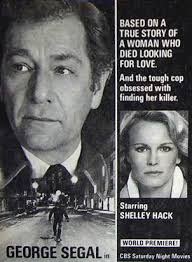
TRACKDOWN: THE FINDING OF THE GOODBAR KILLER
US, 1983, 86 minutes, Colour.
George Segal, Shelley Hack.
Directed by Bill Persky.
Trackdown: the Finding of the Goodbar killer is a telemovie of the early 80s. It focuses on police work and detection. However, as the prologue suggests, it is a follow on to Richard Brook's celebrated and controversial film of the late 70s, looking for Mr Goodbar. In that film, Diane Keaton portrayed a teacher of deaf children who had repressed her sexuality and, living on her own, cruised single bars at night, ultimately encountering a psychotic man who killed her. This film constantly refers to the earlier film. (Tom Berenger, in an early role played the killer.) This is a more conventional film with George Segal playing the detective. Their are complications at home with his wife wanting to leave him and his daughter wanting to go to College. He encounters another teacher of the deaf (Shelley Hack), finds a suspect but decides he is not the killer. Acting shrewdly, he tracks down the homosexual friend of the killer and eventually there is an elaborate set-up to trap and arrest the killer. The film is interesting in its portrayal of detective work.
1. Interesting telemovie? Murder thriller? Portrait of police work and detection? Domestic complications?
2. New York settings, homes, the clubs, the streets? The seamier world of New York? The musical score? The credits and Laura Branigan's Gloria setting the tone for the singles bars?
3. The title, the focus? Audience knowledge of the original film? This film being able to stand on its own?
4. The situation: Mary Alice Nolan and her background, her teaching, her family? Her going to the singles bars, picking up men? Returning to her flat? Her death? The squalid aspects of her life and death? The killer, his angers, homosexuality, relationships, telling the truth to his friend who did not believe him? His leaving for Florida, hoping to escape detection, reading the papers?
5. John Grafton and his work for the New York police, dedicated? George Segal's style? His relationship with his superiors and their help? His associate? The team? His skill in making connections, gathering evidence? Taping the phone call? Suspects, interrogations? Footwork on the streets? His visit to the school, the antagonistic teacher? The later romantic entanglement? His following up the leads with the Popeye drawing? The artists, the recognition of those drawn? His interviewing Cahill? The phone call identity? The set-up of the phone call in Indiana? The raid and the arrest?
6. The background of his relationship with his wife, dedicated to his work, home sequences? The wife wanting to leave? Love for his daughter, seeing her as a child, her wanting to go to Syracuse for study? The portrait of the wife - long suffering, yet loving her husband? Coming home and his jealousy? Her inviting him to stay the night? Love for the daughter, her visits to the precinct? The resolution about her studies? The domestic background to the police work?
7. The suspect, the interrogation? His not being the killer? The teacher and her antagonistic attitude towards the police, the futility of the questions, her giving answers?
8. The homosexual background, the killer and his relationships? His companion not believing him? Attached to him? The phone call, The papers? His dilemma? His being identified? Getting his lawyer? Telling the truth ? and the ordeal of the phone call, leading the killer on, getting him to confess?
9. The portrait? of the killer, any insight into what motivated him? His madness? relationships? His sister ? and the arrest?
10. A portrait of police work, without the guns and the sensationalism of the popular police series and movies of the 70s and 80s?
Published in Movie Reviews
Published in
Movie Reviews
Tagged under
Saturday, 18 September 2021 19:23
Times Square
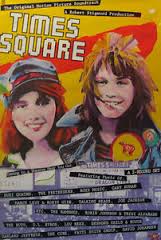
TIMES SQUARE
US, 1980, 106 minutes, Colour.
Trini Alvaredo, Robin Johnson, Tim Curry.
Directed by Allan Moyle.
Times Square is a picture of runaway youth in New York City, the sleazy life in Times Square. However, it is somewhat romanticized in the presentation of the two young girls, Robin Johnson very effective and the streetwise Nicole, Trini Alvarado also very good as the well-educated and spoilt Pamela. The film uses a strong musical score with which its audiences could identify. It also use the role of radio, with Tim Curry as disc jockey commentator looking out on life in the Times Square and being a refuge for the two young runaways.
The film was highly critical of parents, especially Pamela's ambitious father and his raising money for the improvement of Times Square while neglecting or misrepresenting his daughter. The material is more or less as expected: the life of the runaways in a warehouse, taking to the streets, getting jobs in clubs, the music, rebellion, throwing television sets from high buildings, gathering a following as well as the despair and joys of youthful independence. The film was also a portrait of friendship between teenage girls. The film works in the way of a modern fable ? not to be taken too literally, but as a story highlighting social problems and personal problems.
1. Youth oriented entertainment? Youth 1980? A story of runaways, then and now? The ethos of the runaways? The yearning for independence? Parents and authorities? Musical score?
2. The world of New York City especially Times Square and its squalid and sleazy life? A location for runaways? The warehouse, the streets and the clubs?
3. The musical score, the range of songs? The period? Radio, performances, music and lyrics? Protest?
4. The perspective of the film makers on family, parents and children, authority figures, reaction of children? Living on the fringe?
5. Nicki, her wondering the city, her radio? The social workers and their custody? Her rebellion? In Hospital, her behaviour ? eating the flour, reading Nicki's poetry, ridiculing the doctors and their tests? Her escape? Her background, illness, violence, deaths by drowning? Her age and juvenile supervision?
6. The contrast with Pamela, well-educated, with her father on the platform, his story about the film Cuckoo's Nest and misrepresenting her for his purposes? Her writing letters to the radio guru, his reading them, urging her to take a leap of faith and run? In Hospital, reading, fascinated by Nicki's behaviour, writing poetry about her? Nicki inviting her to leave? On the run?
7. The experience of running away, the chase in the hospital, driving the ambulance, carefree? 13 year old girls on the road? How credible? Nicki's living in the warehouse, stealing things, buying clothes? Music, dancing? Going to the club, the interview for the job, refusing to dance topless? Her audition, success in the club? Wondering the streets, encounters with people? The friendship, sharing poetry and the nature of poetry? The dangers in the street? The influence of television and their calling themselves the Sleaze Sisters? Listening to Johnny, the letters? His music? The publicity of their running away? The accusation of kidnapping? Pamela's letter declaring she was not kidnapped but finding herself?
8. Johnny La Guardia and his staff, their writing copy for him? His style, voice? Motivation? On Times Square and looking through his telescope? Above the life of the Square? His talking to youngsters? His work in the studio, the music? Nicole and her visit? Her playing in the studio? His interest in their music? The staff finding them at the club? (And telling Pamela's father)? Nicole and her breakdown, switching her off air? Calling in the authorities? Pamela's attack? His cowardice? Clashes with Pamela's father? At the end, looking down on the concert in Times Square? Sympathetic ? yet an exploitive adult?
9. Pamela's father, his reputation, wealth, changing the face of New York City? His speech and making up the story about his daughter? Taking her to hospital, his power over the doctors? Reaction at her running away, his anger? Question of the police, the media? The clash with Johnny La Guardia and the confrontation? The information about where Pamela was, going to the club and seeing her posing in the mirror, trying to be older than she was, the cigarette etc.? Her running away? The phone call and his wanting her back? Had he changed or not by the experience?
10. The social worker, her understanding of Nicki, her concern, collaboration with trying to get the girls back? Her writing the letter to Pamela about Nicki's health? On Times Square at the end?
11. The change in the two girls, talking and friendship, poetry? Pamela trying to be herself? The letter from Rosie Washington and Nicole trying to kill herself in the river? Unable to? Depressed, with Johnny, her skill with music ?and wanting to be famous, playing in the club with groups, the record? Johnny telling the authorities and her being sedated? Pamela and her exultation to play in the concert? Her making herself up, the other girls listening on the radio, the invitation to come to Time Square and the concert, making themselves up, defying their parents? Nicki and her playing, her speech to the crowd, her acknowledgment of Pamela and her friendship, leaping and disappearing in the square?
12. The adolescent perspective on the children and their behaviour, the antiparent stance? The truth in the fable? Glamour and squalour for runaways? Their ability to cope, stand on their own feet and find themselves?
Published in Movie Reviews
Published in
Movie Reviews
Tagged under
Saturday, 18 September 2021 19:23
Till There Was You
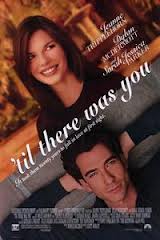
TILL THERE WAS YOU
Australia, 1990, 90 minutes, Colour.
Mark Harmon, Deborah Unger, Jeroen Krabbe, Shane Briant.
Directed by John Seale.
Till There Was You is a glossy Australian American co-production, directed by cinemaphotographer John Seale (Witness and many other Australian and American features, including his Oscar win for The English Patient). The film seems to be a throwback to the B Budget action adventures from Warner Bros and RKO of the early 50s. However, there is no homage in this screenplay - it rather seems an anachronistic screenplay. An American comes to Vanuatu looking for his brother, he encounters racist colonials as well as sympathetic natives (all decked out with bows and arrows - certainly no the reality of the 1980s or 90s). The screenplay uses a number of cliches and expected phrases which makes the whole venture quite predictable. Mark Harmon is the American star. Debra Unger is a rather uncharismatic heroine. Shane Briant snarls like a Nazi. The best performance comes from Jeroen Krabbe, the Dutch actor in many international films. While the film is beautiful to look at, has many attractive shots of Vanuatu and its islands, the screenplay and the acting let the production down.
1. Glossy American Australian co-production, an action romance of the 90s, a throw back to the 50s?
2. The New York locations, the Vanuatu locations and their beauty? The travelogue touch? The musical score ? and especially the theme song?
3. The boys own adventure style of the story, the characterizations? The lack of realism in the plot and the behaviour of the people of Vanuatu?
4. The title, the theme, the romance?
5. Mark Harmon as Frank Flynn, saxophone player, the bar and its closing down, performing, breaking off relationships? His callow attitude? His brother and trouble, going to Vanuatu ? the American presence and presumptions? The rain, passport and visa difficulties, playing the saxophone? Being used by the police? The rain, Anna, the ride, in jail? His beginning of his enquiries? The polo club, Vivaldi and the locals? The bars, being bounced out, the gold? The hints about his brother? The race and his being pushed by Vivaldi? Anna’s bet? Flying to the island, the house and its hospitality, tensions? Search for information, the gold? The escape, flying the plane the crash landing? With the natives, the ceremonies, the discovery of his nephews.
6. Vivaldi as tough, racist, greedy, jovial manner, public behaviour with Anna, private brutality? The race and his cheating? The humiliation? Flying to the island? The house, the weapons man, Rex? The pursuit of the plane, the attack on the house, his desperation with the gun, death?
7. Rex, the nasty Nazi style, caricatured? Pursuing Anna, his disdain, the game with the little boy and being shot by him?
8. The weapons man, slightly mad, the weapon cache? The pursuit, death?
9. Anna, her story, marriage, life on the island, lonely, tension, trying to escape, the public bet, the humiliation, escaping with Frank, with the natives, the attack on the village? Her going to New York?
10. The portrayal of the Vanuatu authorities, shrewd, tough? The night clubs, the bars? People giving clues?
11. Life in the village, testing Frank, the ceremonies, the fall? The rituals and the dancing? The wife and the nephews? The brutality of the Vivaldi's attack?
12. The serious tone of the film, when a light touch was required? An anachronistic adventure movie for the 90s?
Published in Movie Reviews
Published in
Movie Reviews
Tagged under
Saturday, 18 September 2021 19:23
Tales from the Darkside: The Movie
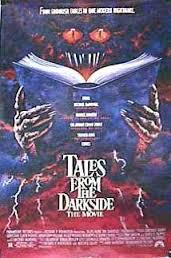
TALES FROM THE DARKSIDE: THE MOVIE
US, 1991, 89 minutes, Colour.
Deborah Harry, David Forrester, Christian Slater, Steve Buscemi, Julianne Moore, James Remar, Rae Dawn Chong.
Directed by John Harrison.
Tales from the Darkside is a compendium of popular horror stories, American style. It is reminiscent of the portmanteau films of the 60s and 70s, so popular in Britain. These tales have always been popular on television, Hitchcock's stories, amazing stories etc. Two of the these stories were adapted by Michael McDowell?, Lot 249 being inspired by a Conan Doyle story. The Cat from Hell screenplay is by veteran horror writer director George a Romero (Night of the Living Dead) from a story by Steven King.
The film has a cast of character actors, the thread story being a tongue in cheek comic horror story as Debra Harry comes home, prepares for a dinner party? with the main course being her young son chained in a caged cell in the home. He tells her stories to delay her cooking him with an ironic happy ending. The films have a number of gory touches - and also play in some ways with the supernatural. It is the kind of film that horror fans really enjoy.
1. Interesting and entertaining collection of horror stories? The overall impact for a feature film?
2. The technical qualities: writers, director? The stars? The importance of special effect and stunt work?
3. The title, the psychological implications of the human psyche, evil, the repression of evil, its coming to the surface?
4. The continuing story: the mother coming home with the shopping, the very ordinary setting, the telephone call about the dinner party, the irony of the young son chained in the cell in the kitchen? Her perfectly normal chatter? Preparing to cook him ? and her conversation with him? His trying to stall with telling tales from the darkside? Her enjoyment of these stories? The irony of his tricking her at the end, his escape with the key, her finally being impaled and going into the oven? His comment on the happy ending? The flip ironic tone for this kind of horror story telling?
5. Lot 249: the university setting, Andy and his friendship with Lee his sister? Lee winning the prize? The clash with Bellingham? His bringing the lot into his apartment? The opening up of the casket, the mummy? The incantation and the mummy coming alive? The brutality of the killing of Lee? The confrontation with Susan and her death? The gory aspects? Bellingham and his satisfaction of revenge for Lee getting the prize and Susan framing him and reporting him to the authorities? Andy and his coping with the disasters, confronting Bellingham, making him destroy the parchment? The irony of Bellingham going off in the taxi (and the non-comprehending taxi driver)? The incantation, Lee and Susan coming alive to threaten Andrew? The implications of the story: honesty, cheating, academic research, the abuse of power, violence?
6. The Cat from Hell: The killer and his taxi ride, meeting the old man, the sinister aspects of the house, the flashbacks - and the visualising of the cat's point of view? The contract on the cat? The old man and his household, his sister and her companion and the servant? His hatred of the cat? The background of his drug company, the testing of the drugs on animals, the death of 5000 cats? Their revenge? His sister falling down the stairs at midnight, the cat taking the life out of the companion, the car crash with the servant? The confrontation with the killer, his fearlessness, offhandedness, the clashes with the cat, the cat clawing him, the blood, his becoming scared? Defying the cat, playing pool? The cat's attacks? His knife, his high-tech guns ? and missing the cat? The cat killing him and going inside him? The old man returning, the daylight? The irony of the clock stopping just before midnight? The stroke of midnight, the cat immerging and killing the old man? The implications of the story for murderers - be they contract killers or owners of companies making drugs?
7. The Lovers' Vow: the dreary New York setting, the gargoyles and statues on the roofs? Preston as an artist, his failure, his selfish agent? His going to the bar, ditched by his agent? The fellow artist? The bartender? Drunk, in the slums and the squalor? The appearance of the devilish monster? The death of the bartender? Preston promising never to tell the truth? His being allowed to live? The sudden presence of the girl, the attraction, his helping her out, taking her to the apartment? Their falling in love? The passing of the years, the happy family and the children, Preston's success? The retrospect exhibition? The effect of the girl on his life? Everything happy? His wanting to show his devotion to her by telling her absolutely everything? His telling her the truth about a demon - her reluctance, her being ~transformed into the demon? The children as demons regretting what had happened? Their going back into stone on the top of the building? The destruction of everything the artist loved? The implications of the story of too much happiness and the unhappiness lurking beneath?
8. How satisfying a collection of horror stories: visually, verbally, special effects, moral implications?
Published in Movie Reviews
Published in
Movie Reviews
Tagged under
Saturday, 18 September 2021 19:23
Tumbleweeds
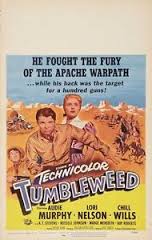
TUMBLEWEEDS
US, 1953, 78 minutes, Colour.
Audie Murphy, Lori Nelson, Chill Wills, Lee Van Cleef.
Directed by Nathan Juran.
Tumbleweeds is the name of the horse that saves the life of Audie Murphy in this ordinary western of the early '50s. Murphy appeared in quite a number of these films during this period, capitalising on his fame as a war hero which he portrayed in To Hell and Back. Chill Wills was a veteran of this kind of film. Lori Nelson was a Universal starlet. Lee Van Cleef was to go on to bigger and better things.
The film shows us a wagon train going through the west, attacked by Indians, Murphy going to negotiate with the chief whose son he had saved, tortured by the Indians and then accused by the townspeople of being a coward. Of course, there is a villain who set the Indians on the wagon train in order to kill his brother and get land which had silver on it. There are Indian chases, lots of confrontations with Indians dying off at a great rate. In some ways the film seems rather quaint in its presentation of cowboys and Indians, but it was par for the course in those days.
1. Popular small-budget Universal western of the '50s? Storyline, characters, expectations, appeal?
2. The American west, the desert, the mountains, the towns? Musical score?
3. The film as an Audie Murphy vehicle, his status as a western hero? Jim Harvey, attacked by the townspeople, with the wagon train, attracted to Laura, helping, hiding them from the Indians, the fights, going out to save them, the Indian chief preparing to kill him, saved by the chief's wife because he had saved her son? His return to the town, accused of being a coward, almost lynched, put in jail for his protection by the sheriff, rescued by the Indian? Getting a horse from Mr Buckley and being helped by his wife, the pursuit, going to the springs, finding the water, the help of Tumbleweeds taking him up the cliff, digging up the water? Found by the sheriff, the confrontation, the Indians and his ruse of playing possum? The revelation of the truth, his pursuit of the villain and fight? The romantic ending? Everything vindicated?
4. The sheriff and his being honourable, trying to protect Jim, the pursuit? His life being saved? Marv and the other people in the town, wanting to hang Jim? The posse, the final confrontation?
5. Lam as the villain, motivation, wanting to marry Laura?
6. Laura, attraction to Jim, her sister-in-law, the siege, the deaths, the sister-in-law's anger at Jim? Laura going with Lam to find Jim?
7. The Indians, the chases, shootings? The saving of the chief's son, the chief and his torturing of Jim? His death and its dignity, revelation of the truth?
8. Popular Hollywood ingredients of the American west? The influence on American thinking about the 19th century and the Indians?
Published in Movie Reviews
Published in
Movie Reviews
Tagged under
Saturday, 18 September 2021 19:23
Two Much
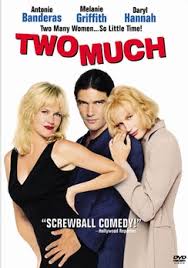
TWO MUCH
Spain/US, 1995, 113 minutes, Colour.
Antonio Banderas, Melanie Griffith, Daryl Hannah, Danny Aiello, Joan Cusack, Eli Wallach.
Directed by Fernando Trueba.
Two Much in the film where Antonio Banderas met Melanie Griffith and they subsequently married - though not in the film. He marries Daryl Hannah.
The film is co-written and directed by Fernando Trueba, who won an Oscar for his Spanish period film La Belle Epoque. It is co-written with his brother David and with novelist Donald E. Westlake (The Hot Rock and other action and criminal stories).
This kind of story works better on the Continent where it seems to be more believable and is done with a lighter touch. The story is about two sisters, one of whom becomes infatuated with an art dealer and imposes on him for a marriage. However, he falls in love with the more disdainful sister. The film spends a lot of time with Antonio Banderas changing into the two different alleged twin brothers and trying to deal with the two sisters.
Joan Cusack gives a very good performance as his assistant (the kind of thing she was to do two years later in Grosse Point Blank. Danny Aiello plays the gangster who is softer than his surface because of his psychiatric sessions.
The film has its entertaining moments, the stars do their best, although Antonio Banderas is really given an impossible task to portray the two brothers believably.
1. The popularity of romance, farce? A successful blend or not? American/Spanish collaboration?
2. The title, the twins, the farce?
3. The Florida settings, wealthy homes, gangsters, art galleries, ordinary apartments? The musical score?
4. Art and his background, his predicament with Gene, at the funeral, escaping in Betty's car, the whirlwind romance and sex, the proposal of marriage, his accepting? His meeting with Liz in the shower, the embarrassment, his falling in love with her? His relationship with his father? Coming from Spain, setting up in Florida? Gloria and the management of the office? Manny and his art - and Art having given up painting, managing the artists, giving Manny his favourite painting? His letting himself into the predicament with Betty and Liz - unable to get himself out except by extravagant behaviour?
5. The farcical aspects with the creation of Bart, the phone calls to each other, the different appointments, dinners, the maitre d' at the restaurant and his disdain, the bed and shower sequence, at the art gallery?
6. Betty and her flibbertigibbet style, marrying Gene twice, the importance of the number 3, her fights with Gene, infatuated with Art and the car, the sexual relationship, Liz and her advice, going to the gallery, meeting Gloria, going to the dinner, Art spiking her wine, being in a coma, the next morning, the wedding, overhearing Gene's declaration via the phone, marrying him again?
7. The contrast with Liz, serious, accusing Art of being a gigolo, attracted by Bart and his opinions, going for coffee, the dinner, the visit to his apartment, taking the painting, not believing the truth, finally convinced?
8. Gloria and her work at the office, her quips, going out with Manny, romance?
9. Art's father, the story of his being in Spain, the Lincoln Brigade, his flirting with Gloria, with Liz, the card game, the reckless driving, trying to save his son?
10. The psychiatrist, losing his ring at the beginning, at the wedding, dealing with Gene and with Betty, finding the ring at the end - and his comment about Freud?
11. Gene, his henchmen, tough, sentimental, reliance on his psychiatrist?
12. The build-up to the wedding, Art trying to be both characters, talking with himself, the phone, his being left at the altar?
13. His going back to work, painting, Gloria and the gallery, his exhibition, Liz's exhibition, the happy ending?
Published in Movie Reviews
Published in
Movie Reviews
Tagged under
Saturday, 18 September 2021 19:23
Tortilla Soup
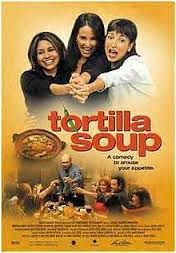
TORTILLA SOUP
US, 2001, 103 minutes, Colour.
Hector Elizondo, Jacqueline Obradors, Tamara Mellow, Nikolai Kinski, Paul Rodriguez, Elizabeth Pena, Raquel Welch.
Directed by Maria Ripoll.
The continued success of television programs on food and cooking as well as the number of books available for creativity in the kitchen means that the general public enjoys looking at cooking. In fact, a friend remarked that it would be interesting to do an article on the films which have focussed on cooking recently.
In the last year there has been What's Cooking (from the director of Bend it like Beckham, which also had some Indian kitchen sequences) and Dinner Rush (about life in a New York restaurant and behind the scenes in its kitchen). One of the other films he mentioned was Eat Drink Man Woman, an engaging Taiwanese film by director Ang Lee who made Sense and Sensibility and Crouching Dragon, Hidden Tiger. It is about a family where the patriarchal father, a top chef, is losing his sense of taste. He is also losing his three daughters who are feeling the need to leave home and experience their independence. It was a humorous film with some serious undertones.
In looking at the information about the new release, Tortilla Soup, we found that, in fact, it is a remake of Eat Drink Man Woman and a very close remake at that. The film-makers have shifted the action to Los Angeles and the Hispanic community and it works well using all the benefits of the original. It does mean that the characters are much more emotional and volatile than the comparatively quiet Taiwanese.
Hector Elizondo is the chef who demands that his daughters never miss his Sunday dinner - banquet is more like it. If you enjoy seeing detailed food selection and preparation as well as the cooking and the delicious meals, then you won't be disappointed. (And don't leave before the final credits where there are photo stills of all the dishes.)
On the serious side, we see the perennial problems that crop up in families. Dad, a widower, does not realise how restrictive and controlling he is. The young daughter wants time off to 'find herself' before going to college and moves in with a boyfriend. The middle sister has a good job offer in Barcelona but would rather be a chef like her father. The prim oldest sister seems to have been influenced away from her Catholicism by a devout Fundamentalist group. She thinks she is being courted by the school baseball coach. There is also a neighbour with a little daughter and a whirlwind visit from her dominating mother (played effectively by Raquel Welch in a rare screen appearance).
So, while the family eat many wonderful meals, they also sort out their problems. The end is positive and full of hope. Perhaps our own cuisine is rather more staid than what we see on screen, but the problems and the solutions are just as real.
1. An entertaining comedy-drama? The Hispanic community of Los Angeles? The blend of United States and Mexico, Brazil and Argentina?
2. The adaptation from the Taiwanese film, Eat Drink Man Woman? The close following of the screenplay, situations, characters? Universal issues?
3. The Los Angeles locations, homes, workplaces, schools, the streets? Colourful and bright? Not a dangerous place, one for interrelationships and love? The musical score?
4. The focus on the family, Martin as patriarch, his having his daughters around him, especially for the Sunday dinner? His preparations, their presence, discussions? The family having to change, the girls growing up?
5. Martin, widower, people's comments about him, his preparing the meals for his daughters? His love for them, control and expectations? His losing his sense of taste and its effect on him? Having to go to the restaurant? His skills as a chef? His collaboration with the staff, his friendship with Gomez? Gomez and the tasting, the collapse, hospital, returning to the restaurant and dying? The funeral and Martin's reaction? His attitude towards each of his daughters, to Carmen and her business life, his not wanting her to be a chef, her relationships? His relationship to Letitia, her religiosity, saying Grace? To Maribel, wanting her to go to college, youthfulness and rebellion? His friendship with Yolanda and Yolanda's daughter, making the lunches for her, going to school, exchanging them? Yolanda finding out and keeping her daughter's secret? The arrival of Hortensia, his interactions with her, her misinterpretation of his attentions? Falling in love with Yolanda, the preparation of the dinner, the announcement? His future and a happy marriage? Yolanda pregnant?
6. Carmen, her broken relationships, her business world connections, the possibility of going to Barcelona? At home, the interaction with each sister, her care for her father? Her interest in cooking, her father's criticisms? Her support of each of the sisters, especially in their relationships? The final decision to go, to the airport, her father's farewell? Her return home? Her working in the restaurant and fulfilling her ambitions as a chef?
7. Letitia, religiosity, her Catholicism, her born-again Christianity, her long Graces and prayers? Prim and proper? Meeting Carmen, the possibility of her changing her hair and her fearful reaction? The cards and the poems - and the cruel irony that she was being teased by the students? Her thinking it was Orlando, watching him, the approach, waiting for the cards? Her finally transforming her appearance, the reaction of the students and the staff? Her going onto the baseball field, kissing Orlando? Discovering the truth, his sensitive handling of the situation? Their falling in love, hurrying to Las Vegas to be married, coming to the meal, announcing it to Martin? His acceptance of it?
8. Maribel and her age, work in the shop, meeting Andy by chance, having the coffee with him? The growing friendship? Her reaction against her father, wanting to find herself, announcing that she was not going to college? Her angry response and moving in with Andy, transforming his apartment, cleaning things up, putting his papers where he couldn't find them? Driving Andy berserk? Their clash, her wanting to move out? Her finally calming down, acknowledging the mess she was making of her life?
9. Hortensia and her fussing about her daughter, wanting to marry Martin? The contrast with Yolanda, her quiet, her daughter, the divorce coming through?
10. The family meal, the couples all gathered together, Martin and his speaking in Spanish and English, which he had previously forbidden? His later rediscovering his sense of taste? The announcement about his marriage? The happy response - and the final meal where everyone was gathered around?
11. The focus on food, selection, preparation, cooking, the visuals of the meals? The final credits and the stills? The focus on food in itself, as a means of communication, of celebration? Family problems and family love in the context of food and meals?
Published in Movie Reviews
Published in
Movie Reviews
Tagged under
Saturday, 18 September 2021 19:23
Total Eclipse
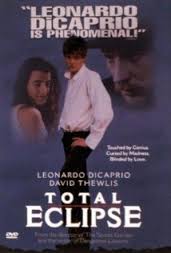
TOTAL ECLIPSE
France, 1995, 103 minutes, Colour.
Leonardo di Caprio, David Thewliss, Romane Bohringer, Dominique Blanc.
Directed by Agnieszka Holland.
Total Eclipse is serious, a portrait of two influential but very unpleasant 19th century French poets, Verlaine and Rimbaud. With biographies of composers, one can listen to the music; with painters, one look at their art; with dramatists, one can look at their plays. But, with poets, as in this film (where, in fact, very little of the poetry is spoken), it is very difficult to gauge the art of their poems. This means that it is difficult to relate the art to the artists, especially when one is a young boor and the other is brutal to his wife when drunk. The film shows what we would now call their co-dependence and their sexual relationship (anticipating Wilde and his trial by 20 years).
For those interested in the period and the poets, the film is interesting. For a general audience, it would prove tedious. David Thewlis is good as Verlaine. Leonardo di Caprio is well cast as Rimbaud but his fans may be surprised at his choice of role (made before Romeo and Juliet and Titanic). Talented but unpleasant poets.
1. Audience awareness of the poets Rimbaud and Verlaine? Their poetry, their influence in 19th century poetry, in 19th century French literature? World literature?
2. The re-creation of the period: the 1870s and 1880s? The French countryside and country towns, Paris? Brussels, London? Abyssinia in the 1880s? Costumes and décor? Locations? The musical score and its romanticism?
3. The title, the reference to Rimbaud's poetry? The relationship between the two poets? The death wish?
4. The voice-over and the commentary by Verlaine, his own experience, the encounter with Rimbaud, the poetry, the relationship, the co-dependency? His ultimate achievement, ultimate failure?
5. French poetry, the 19th century, conventional and traditional verse, the introduction of symbolism and modernism? The examples of poetry throughout the film?
6. Verlaine, his age and experience, reputation, his marriage to Matthilde? His relationship with his in-laws, the owner of the house? The unexpected letter from Rimbaud? His admiration for his poetry? The invitation, missing him at the station, passing in the street with the mockery? The surprise at his age? Response to his boorish manners? The beginning of the infatuation, being together, the sexual attraction? Rimbaud's dominance? Verlaine's return to his wife, her pregnancy, his drinking, his brutality to her when drunk, his apologies and getting further drunk? The birth of the child? His absences with Rimbaud, their discussions, the developing sexual relationship? Going backwards and forwards to his wife? His leaving her, going on the trek through the countryside, their sharing nature and poetry? His going back to Matthilde, promising to be with her, leaving the train, poking a face at her? Going to London, the writing, spending the money? Rimbaud brutalising him? His leaving, going to Brussels, sending the letter? The arrest, the condemnation for sodomy, his imprisonment for two years? The later encounter with Rimbaud, in the country, his departing, abandoning Verlaine? Divorced, getting old? The visit of Rimbaud's sister wanting the poetry back, the talk of conversion, explaining his death? Verlaine tearing up the address? A portrait of a genius, artistically gifted, yet, as a human being, brutal and insensitive?
7. Rimbaud and his age, poetry, sense of genius, talking about himself, abandoning the country? Arriving in Paris, his manners at table, his insensitivity to everyone, pilfering from Verlaine's father-in-law and then encountering him? His joyful aspects of his poetry, his depression? The friendship with Verlaine, dominating him, wanting to learn from him? The homosexuality, his dominance? His following Verlaine back, his despising of Matthilde? The in-laws? The trek in the country and the exhilaration? Going back home but going to Verlaine, seeing him with his wife, taking him away again? His writing in the libraries in London, his insulting Verlaine, brutal towards him? His desperation, going to Brussels? Going back home, completing his work? The final break? His going to Africa, his dream of going on and on and its becoming a reality? His research, not writing any poetry, his being a businessman? Ageing, with the people in Africa, heterosexuality? His illness, the return to Marseilles, the amputation of his leg, his sister looking after him, his death? His contribution to poetry?
8. Matthilde, simple, in love with Verlaine, pregnant, brutalised by him, going back to him, finally disappointed and divorcing? Her parents and their support of her?
9. Literary society in the 1870s, Rimbaud and Verlaine going to the poetry reading, Rimbaud and his mockery of the reader, the fights? The literary pretensions of the age? The political background, the communes and the wars, Verlaine's involvement and the police after him?
10. How well did the film recreate the French scene of the 1870s, socially, politically, literary? Moral values? The transition to the 20th century and its changes?
Published in Movie Reviews
Published in
Movie Reviews
Tagged under
Saturday, 18 September 2021 19:23
Twin Peaks: Firewalk With Me
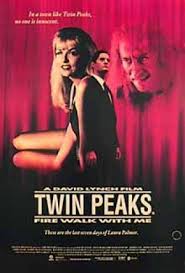
TWIN PEAKS: FIREWALK WITH ME
US, 1992, 129 minutes, Colour.
Sheryl Lee, Ray Wise, David Lynch, Kiefer Sutherland, Madchen Amick, Moira Kelly, Kyle MacLachlan?, Peggy Lipton, Heather Graham, Jurgen Prochnow, James Marshall, Harry Dean Stanton, Grace Zabriskie, David Bowie, Miguel Ferrer, Lennie van Dohlen.
Directed by David Lynch.
Twin Peaks: Firewalk with Me is based on the very popular television series created by David Lynch, Twin Peaks. To appreciate the film fully, one needs to have seen the series or most of it. The film presupposes audience knowledge of the town of Twin Peaks, the characters, the murder mystery, especially the death of Laura Palmer, and her father being the murderer.
David Lynch has always been interested in the dark side of the American character, the dark side of the small American town. This is particularly to the fore in his films like Eraserhead, especially Blue Velvet, Wild at Heart, Lost Highway, Mulholland Drive. However, he is capable of directing films with much different atmospheres and more optimism, such as The Elephant Man and The Straight Story.
Lynch has created an archetypal west coast American small town, setting in Washington and Oregon states. People go about their business, but underlying are all the demons of the American character. Laura Palmer, the central figure, is a small-town sexpot, promiscuous, drug-taking, callous in the face of violence. However, Lynch sees her as needing to be redeemed - she has visions of light, experience of the transcendent which puzzle her, and eventually she seems to ascend to Heaven in a kind of theophany, accompanied by the FBI agent Cooper. This is symbolised in Laura looking at a portrait of the guardian angel with children and the angel disappearing from the picture - and later appearing as she ascends into Heaven. Her father, on the surface a benign businessman, is sexually preoccupied, focused on his daughter, seems to be schizophrenic in some ways, violence surfaces and he is brutal, especially in the death of his daughter. Cheryl Lee played Laura Palmer in the series and Ray Wise her father. They reprise their roles in the second part of the film.
The film also casts many of the characters from the television series, especially Moira Kelly as Laura's friend Donna, James Marshall as her boyfriend James, and Dana Ashbrook as the drug-dealing and murdering Bobby. There are interesting guest appearances from Kiefer Sutherland as a rather slow FBI agent, Kyle MacLachlan? reprising his role as agent Cooper, minute appearances by Jurgen Prochnow, David Bowie, Heather Graham, Lennie van Dohlen.
The first part of the film focuses on the investigation of the death of a young woman named Teresa Banks. This gives the opportunity for the FBI agents, including David Lynch wearing a hearing aid and shouting, to parody the police and FBI investigation films, especially the local police. The second half of the film focuses on the six days before Laura Palmer's death, the FBI agents disappear and the focus is particularly on the family and friends.
This is a technique that David Lynch uses in many of his films, especially Lost Highway and Mulholland Drive, where the first part of the film presents one world where the audience gets accustomed to the characters and the issues, and then suddenly makes a transition to another world which upsets audience expectations, making emotional demands as well as their trying to puzzle out what is happening and why.
Lynch raises a great number of issues. However, his elliptical style, his esoteric approach, the sinister music of Angelo Badalamenti (composer on all his films), the use of light and darkness, the introduction of fantasy images, can be bewildering and not lead audiences to clear resolutions and conclusions about what is happening and the motivation of the characters. The film needs to be seen as a part of David Lynch's canon.
Published in Movie Reviews
Published in
Movie Reviews
Tagged under